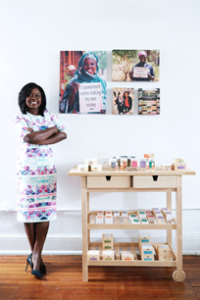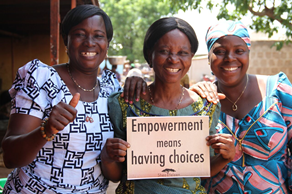From rejuvenating lip balms to nourishing shampoos, shea butter is used in one form or another every day by many people around the world. Unfortunately, the healthy sales of this transformative product does not stimulate the local economy despite all of the production of shea butter is done by hard-laboring women in African countries such as Ghana or Burkina Faso. These women would benefit greatly from the security of an income source, but, most survive on only $2 per day, not nearly enough compensation for their painstaking efforts (GlobalPost, 2014).

Shea Yeleen founder Rahama Wright Source: Shea Yeleen
Shea Yeleen International, Inc., founded by Rahama Wright in 2005, is different. Shea Yeleen is trying to fix this unjust practice by providing the women with proper facilities to produce the Shea Butter and a livable wage, nearly five times the minimum wage in Ghana. This economic freedom allows the women to live more comfortable, stable lives, and have access to necessary resources to pursue other passions. The livable wage is used to drastically change the lives of the women, uplifts families and the future of their countries. The most notable impact of paying a livable wage is the investment towards the education of their children. This investment helps to ensure that the future of Ghana has an upper hand over currently uneducated population. Although it is a mutually beneficial system, Shea Yeleen does not want the female producers to stay in the Shea Butter industry forever; the company instead hopes to help empower them for the rest of their lives to be able do whatever they desire (Shea Yeleen, 2017).
Rahama Wright achieved her goal of raising awareness and improving conditions for women in the Ghanaian Shea Butter Market. She built a company which specializes in Shea Butter, a product of which she had no previous knowledge. Before Rahama started Shea Yeleen, she did something that she suggests to anyone who is passionate about making a change in their society: substantial research. Before starting a company or launching a project, Rahama advises people become well versed in the issue they are trying to address before starting their efforts. Once research is complete and a feasible path to change is identified, Ms. Wright encourages people to try tackle the chosen issue at full speed. Rahama, using her own company as an example, urges anyone who is passionate about an issue to do whatever they can to address it, big or small.
Shea Butter is the product of the ground up nuts of a Shea Tree, a tree indigenous to Africa. The fruits of the Shea Tree are skinned to reveal a nut on the inside. The nut is then dried and cracked open, leaving just the meat of the nut. The nuts are washed and sun dried before being crushed into smaller pieces and then roasted. The roasted pieces are sent through a machine which turns them into a thick paste. The paste is placed in large buckets and churned, while gradually adding water, for many hours until the water separates from the butter oil (Cof, 2017).

Three Ghanaian Shea Producers Source: Shea Yeleen
Most of the Shea Butter currently on the consumer market is refined Shea Butter. According to Wright, “around 90% of the global Shea market that’s brought to market is not coming from Africa even though the tree grows in Africa [and] African women are the traditional processors. The majority of Shea that enters the marketplace is actually coming from large seed oil manufacturers in Europe and Asia and they’re utilizing a completely different process to extract the oil that’s contained in the shea seeds than what women in local rural communities in Africa use. They use chemicals, deodorizers, and solvents [that are] not only harsh in terms of the processing but also harsh on the environment…”(Rahama Wright’s Shea Yeleen, 2017). Shea Yeleen does not do this, they use only pure, unrefined Shea Butter with natural ingredients.
Rahama Wright has a goal of creating a system in which both women and the environment are protected. This led her to become the Founder and CEO of Shea Yeleen. However, she does not see herself staying as CEO in the future, she hopes to eventually step away from position of CEO and instead become the spokesperson of the company. During an interview with Ms. Wright, she mentioned her favorite Shea Yeleen product is the 100% Pure Unscented Body Balm. Although the Lavender Honeysuckle Body Cream is consistently their most popular item, Wright prefers the Unscented Body Balm because she loves the smell of it, something she describes to the likes of a nutty apple pie. Ms. Wright, a sufferer of dry skin, swears on the fact that it is the only thing that helps. Shea Butter is a transformative products that helps people of many different backgrounds in beneficial ways.
By Diba Ghaed, Bethesda Green Leadership Academy Intern
Sources
GlobalPost. (2014, March 30). Increasingly Popular Shea Butter Comes From Some Of The World’s Poorest Communities. Retrieved September 20, 2017, from http://www.businessinsider.com/shea-butter-africas-markets-2014-3
Cof, K. (2017, June 27). Making Shea Butter in Ghana. Retrieved September 20, 2017, from https://safarijunkie.com/ghana/making-shea-butter-in-ghana/
TV2Africa. (2017, September 07). Rahama Wright’s Shea Yeleen. Retrieved September 20, 2017, from https://www.youtube.com/watch?v=637MupSWCI0
Shea Butter Products. (2017). Retrieved September 19, 2017, from https://www.sheayeleen.com





